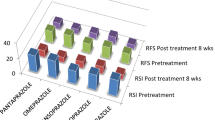Abstract
Aim
To clinically evaluate the patients of laryngopharyngeal reflux(LPR) and their response to Proton Pump Inhibitors(PPIs) using laryngeal Reflux Symptom Index (RSI) and Reflux Finding Score (RFS).
Method
This prospective observational study was conducted on 128 patients attending the ENT-OPD of VSSIMSAR,Burla,India, who had persistent laryngeal symptoms for more than 2 months.Data was collected using standardized RSI and RFS after taking detailed history and laryngoscopic examination.Patients who were diagnosed of LPR on the basis of their RSI & RFS were subjected to treatment with PPI-Pantoprazole & were called back for follow up at 2nd, 4th and 6th months.Pre and post treatment RSI & RFS were compared using appropriate statistical tests and results with p-value< 0.01 were considered statistically significant.
Results
The overall effect of PPIs on all symptoms & signs of LPR,included in RSI and RFS respectively,is statistically significant except on swallowing (not statistically significant at p <0.01) showing a careful usage of RSI & RFS while diagnosing LPR clinically.Study also elucidated that PPI are effective in relieving symptoms of LPR patients.Evaluating Pearson correlation coefficient,the value of R=0.3717;R2 =0.1382 shows low positive correlation between the RSI & RFS.RSI & RFS are related to each other and any change in the RSI will affect the value of RFI and vice versa.
Conclusion
From this study we conclude that LPR is prevalent in age of 28-37 years & has female preponderance.PPIs are effective in treating LPR.Though RSI and RFS are effective and valid parameters for managing LPR cases but have to be used cautiously while interpreting the results.




Similar content being viewed by others
References
Mishra P, Agrawal D, Chauhan K et al (2020) Prevalence of Laryngopharyngeal Reflux Disease in Indian Population. Indian J Otolaryngol Head Neck Surg. https://doi.org/10.1007/s12070-020-01882-1
Toohill RJ, Kuhn JC (1997) Role of Refluxed Acid in Pathogenesis of Laryngeal Disorders. Am J Med 103. https://doi.org/10.1016/S0002-9343(97)00333-1. 100S-106S.
Belafsky PC, Postma GN, Koufman JA (2002) Jun;16(2):274-7.doi Validity and reliability of the reflux symptom index (RSI). J Voice. : https://doi.org/10.1016/s0892-1997(02)00097-8. PMID: 12150380
Koufman et al (2009) Prevalence of esophagitis in patients with pH documented laryngopharyngeal reflux. Laryngoscope. https://doi.org/10.1097/00005537-200209000-00014
Massawe, Surgry N et al https://doi.org/10.1016/j.wjorl.2020.04.009
Vaezi MF, Hicks DM, Abelson TI, Richter JE (2003) Laryngeal signs and symptoms and gastroesophageal reflux disease (GERD): a crit- ical assessment of cause and effect association. Clin Gastro- enterol Hepatol 1:333e344
Bhargava A, Faiz SM, Srivastava MR et al (2019) Role of Proton Pump Inhibitors in Laryngopharyngeal Reflux: Clinical Evaluation in a North Indian Population. Indian J Otolaryngol Head Neck Surg 71:371–377. https://doi.org/10.1007/s12070-018-1493-2
Lechien JR, Saussez S, SchindlerA, Karkos PD, HamdanAL, Harmeg- nies B et al (2019 May) Clinical outcomes of laryngopharyngeal reflux treatment: a systematic review and meta-analysis. Laryngoscope 129(5):1174–1187
Chappity P, Kumar R, Deka RC, Chokkalingam V, Saraya A, Sikka K (2014) Proton Pump Inhibitors Versus Solitary Lifestyle Modification in Management of Laryngopharyngeal Reflux and Evaluating Who is at Risk: Scenario in a Developing Country. Clin Med Insights Ear Nose Throat 7:1–5
Nunes HS, Pinto JA, Zavanela AR, Cavallini AF, Freitas GS, Garcia FE (2016) Comparison between the Reflux Finding Score and the Reflux Symptom Index in the Practice of Otorhinolaryngology. Int Arch Otorhinolaryngol 20(3):218–221. doi:https://doi.org/10.1055/s-0036-1579557
Shah RV, Vishwakarma R (2017) Laryngopharyngeal reflux: Is it the real culprit in patients with laryngeal complaints? Int J Phonosurg Laryngol 7:69
Mesallam TA, Stemple JC, Sobeih TM, Elluru RG (2007) Reflux symptom index versus reflux finding score. Ann Otol Rhinolaryngol 116(6):436–440
Acknowledgements
The following investigator also helped in this study : Dr.Vijay Kumar ,Resident doctor, Department of Orthopaedics,Jupiter Hospital,Thane,Maharashtra. Dr. Deepakraj V. ,Assistant Prof, MS ENT.
Funding
No funding from the institution was obtained.
Author information
Authors and Affiliations
Corresponding author
Ethics declarations
Conflict of Interest
The authors declare no conflicts of interest.
Ethical Approval
Taken from ethical committee.
Ethical Statement
Ethical approval taken from ethical committee & informed consent from the study participants.No funding from the institution was obtained.The authors declare no conflicts of interest.
Additional information
Publisher’s Note
Springer Nature remains neutral with regard to jurisdictional claims in published maps and institutional affiliations.
Rights and permissions
Springer Nature or its licensor holds exclusive rights to this article under a publishing agreement with the author(s) or other rightsholder(s); author self-archiving of the accepted manuscript version of this article is solely governed by the terms of such publishing agreement and applicable law.
About this article
Cite this article
Kapil, A., Acharya, S., Bepari, K. et al. Clinical Evaluation of Laryngopharyngeal Reflux and its Response to Proton Pump Inhibitors. Indian J Otolaryngol Head Neck Surg 75, 409–415 (2023). https://doi.org/10.1007/s12070-022-03219-6
Received:
Accepted:
Published:
Issue Date:
DOI: https://doi.org/10.1007/s12070-022-03219-6




